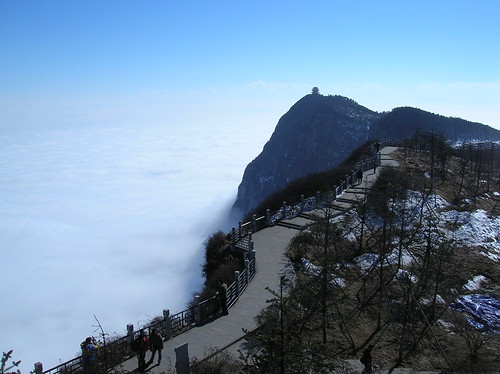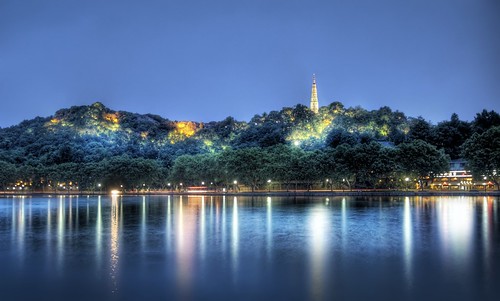I've got an excellent resource to share with you today! ChinaBlog is an extensive blog about China. But you probably surmised that! It's chock full of great information about China - travel, music, culture, stories, art, and museums. Once you delve in, you'll be planning a trip to China! We were lucky enough to sit down and chat with Jensen Liu, creator of ChinaBlog. Here's what he had to say...
WE: Please tell us about your site, ChinaBlog.cc..
CB: Thank you very much for interviewing me. If you find my English is awkward, I apologize about that. I know I need to improve my English skills.
ChinaBlog.cc is NOT just another China blog with a fancy .cc country code. The keyword is "TIMELESS".
China is one of the rising hot topics in the blogosphere. There are many successful China related blogs already, for instance, danwei.org, chinasmack.com, shanghaiist.com, etc.
However, the secret is that all of these popular China themed blogs are "news-breaking" blogs. Something is missing here. Yes, a "Timeless" China blog.
ChinaBlog.cc is a "non-news" blog. My aim is to develop a hub for all people who are interested in timeless information about China and Chinese Culture.

Cruising in Three Gorges photo by Keith Marshall
WE: What was the genesis of your site?
CB: It's a long story that dates back to my college years. Although my major was in Biological Sciences, I was a distracted student in college. I spent lots of efforts on developing IT skills, reading literature, attending cultural events, and exploring all sorts of museums in Beijing.
In 2005, close to graduation, I started my first blog when bulletin board system (BBS) is still prevalent in China. That summer, coming to US to pursue my PhD, I moved my blog onto MSN spaces for its MSN messenger integration feature.
In 2008, I went back to China for a two-month vacation before the opening of Olympic games. In a meeting with an American professor in Peking University and my Chinese seal master, we decided to take advantage of ever increasing global interest in China/Chinese culture and build a website to promote Master's traditional Chinese art.
Back in the US, I met a young Chinese entrepreneur who was on his idea-searching trip to USA after successful NASDAQ IPO of his previous start-up. We had several long discussions about the opportunity in culture exchange market.
Getting inspired and excited, I decided not to wait for anyone and started a website (now discontinued) about Chinese Seal with static pages at Google pages. Before long I realized this topic is too specific and doesn't have much audience. Then I switched to translating Chinese short stories with self-hosted Wordpress platform. Eventually I expanded even broader into a general China/Chinese culture blog.

Mount Emei and Golden Top by Lanfranch
WE: What can readers find on your site?
CB: As I mentioned above, my aim is to develop a hub for all people who are interested in timeless information about China and Chinese Culture.
Internet is an ocean of information. There is enormous amount of information online about China/Chinese culture already. However, from a reader's point of view, that information is not always easily accessible and consumable. I found there are at least three types of inconvenience.
1) Some are too formal. For Wikipedia or Government-run websites, they are just too formal to be reader friendly. They are archived materials for the purpose of accuracy. But they lack the vividness and reader-oriented tone of a blog.
2) Some are too discrete. In Web 2.0 era, lots of precious information is generated by users at online communities, such as Flickr images and YouTube videos. When I saw these great images and videos, I realized I should share these multimedia treasures at a central place with explanatory texts. They are flowers hiding in the dark corners of deep valley. I'd like to show their glories to everyone.
3) Some are in Chinese only. Even with machine translation, language barrier is still a problem across the country borders. While lots of information in Chinese is still waiting to be translated, lots of new information is generated in the Chinese-speaking world everyday. I am very happy to translate valuable ones and introduce them to the world.
Overall, at ChinaBlog.cc, you can find non-news information about China/Chinese culture. Right now, I have five main categories: Travel Art, Story, Music, Museum … and a "Misc" category for other topics. I am also running a "China Carnival" blog carnival for readers to share their own China experiences.
To make my posts more organized, I usually post them in series. So far, I've finished a "Chinese Residential House" series (10 posts), a "Chinese Traditional Art" series (10 posts) and "Chinese Music Classics of 20th Century" series (6 posts). A "Scenic Splendor of China" series and a "Forbidden Treasures" series are going on right now.

WE: How do you technically manage the blog?
CB: For those who are interested in technical side of self-hosted blogging, I can tell you that I handle all tech backend myself. And trust me, it's not rocket science. You can master it too, if you are willing to learn. I recommend you read Darren Rowse's problogger.net to learn about blogging.
ChinaBlog.cc is hosted at Dreamhost (and I am planning to move onto Media Temple later this year for better service). Domain name at godaddy.com. It's powered by Wordpress with a self-modified theme combining two great free themes: arthemia and iNove.
Probably the most challenging part of technical work is to make your blog look like what you want. It took me several months to try different themes, make images using Adobe FireWorks, modify theme HTML/PHP codes, adjust CSS frameworks and typographics, and eventually settle down like what it looks right now.
WE: What are your top travel tips for people journeying to China?
CB: You can find lots of tips for China trips online for sure. Personally, I'd like to emphasize on two points here:
1) Try to avoid major holidays and weekends.
China has a huge population. On major holidays and weekends, popular places of interest are packed with crowds of people. It's really hard to enjoy the trip when all you can see is people.
I still clearly remember my two visits to Beijing Botanical Garden in 2005.
One visit was on May Day (International Workers' Day), I could barely move my feet in the crowds. And women took over men's room since women's room was definitely not enough to process the long queue. My 2nd visit was on the following Monday. It was extremely quiet. I met less than 10 human beings in the 400 hectares garden.
2) Do homework and get some background information.
One unique thing about attractions in China is its deep integration of nature and humanity, a combination of natural/scenic beauty and historic/cultural spirit.
Hiking onto top of the magnificent Mount Emei, you will find a Buddhism Temple which was built 1200 years ago; Cruising along the splendid Three Gorges, you will review the stories of "Romances of Three Kingdoms" happened 1800 years ago; Wandering by the beautiful West Lake, you will hear the drama of many famous people of different dynasties, such as Dongpo Su, Juyi Bai, Fei Yue, Xiaoxiao Su, Tale of White Snake, etc.
It would be really a pity if you come to see China but didn't know the rich historical/cultural background.

Three Sacred Mountains of Daocheng, Sichuan, by utpala
WE: How do you suggest travelers give back, while visiting China?
CB: Thanks for offering to give back. IMHO, foreign travelers can help a lot preserve fading traditional Chinese culture.
After the devastation of Culture Revolution and modernization afterward, traditional Chinese culture is at the brink of extinction nowadays. Young generations fall in love with western culture especially American culture. Traditional stuff is considered outdated, faded, retro, boring, etc.
Foreign travelers can help a lot without much efforts for at least two reasons:
1) Credibility: For some reasons, foreigners have lots of privileges in China. You have better influence on Chinese people than Chinese themselves. If you tell local people the value of their traditional culture. For a better chance they will listen.
2) Economical: The purchasing power of western currency is high in China. Your little money might be a fortune to local people. So if you buy some traditional Chinese culture souvenirs, you might improve a folk artist's life and prove the value of traditional culture as well.

West Lake, Hangzhou, by Stuck in Customs
WE: Is there anything else you'd like to share with us?
CB: Yes. Your website name "Wandering Educators" reminds me a very interesting life style of some foreigners in China -- "Foreign teachers".
In my high school, my foreign teacher was from US, a young tall guy. He taught us English. His salary was twice as much as the best of his Chinese colleagues. His class was generally very simple, like kindergarten style.
He spent all his sweet salary and plenty spare time travelling in China. After two years, he finished exploring entire China, resigned the job and went back to US.
He didn’t need a single cent of his US money to travel in China. All he needed to do was to teach some easy English classes.
If you are interested in travelling in China but worrying about budget, maybe to be a "foreign teacher" is worth considering as your alternative plan.
"Wandering" and "Educating", I am sure you will never forget either experience you have in China.
WE: Thanks so much! We just love your site.
For more information, please see:
Feature photo courtesy of Luo Shaoyang. All photos used under Creative Commons from Flickr


